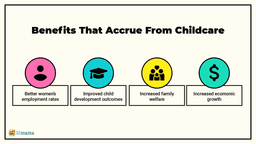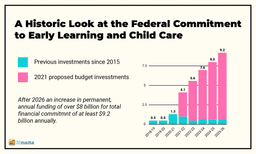Canadian Government Announces a $30 Billion Investment in a National Childcare Program
The Canadian federal government announced $30 billion in funding for early learning and childcare programs across Canada with the vision of providing a national childcare program for all Canadians as part of their federal budget.
The announcement was driven by delivering on a long-promised national childcare program and providing support to empower parents to return to work after COVID. Women in particular have been hardest hit by unemployment due to COVID as many have not been able to re-enter the workforce.
COVID has brutally exposed something women have long known: without childcare, parents – usually mothers – can’t work
Finance Minister, Chrystia Freeland
We’ve dug into what this means for the child care sector in Canada and connected with various early childhood directors, owners and advocates in the space to learn their thoughts on this announcement.
- What’s included in Canada’s childcare plan?
- What do Directors and Owners think about this announcement?
- Amanda Munday, CEO of the Workaround
- Carolyn Ferns, Policy Coordinator of the Ontario Coalition for Better Child Care.
- Program Administrator in Port Alberni, British Columbia
- Alana Powell, Executive Coordinator of Association of Early Childhood Educators Ontario
- Ryan Eickmeier, CEO of Helping Hands Daycare
What’s included in Canada’s childcare plan?
Overall the details of how the plan will be rolled out are still in question as the federal government will be giving each province and territory the ability to determine how the money will be spent. The budget did however include these guiding principles.
Parents should expect to pay $10 per day on average to receive high-quality care by 2022
The vision of the plan is to ensure that Canadians have access to affordable and high-quality care by decreasing childcare costs to $10 per day on average for all Canadians over the next five years.
- $30 billion will be provided by the federal government to deliver on this vision, with provinces and territories intended on delivering the other 50% of the cost.
- Parents should expect to pay 50% less for childcare on average by the end of 2022 (outside of Quebec).
- By 2025-26 all regulated childcare spaces will be offered to parents for $10 per day on average.
- Focus on improving and expanding before and after care in order to provide parents with more flexibility in care options
- Ensuring the annual growth of high quality spaces across the country by building on the 40,000 new spaces already created through previous federal investments
- These targets would apply everywhere outside of Quebec, where prices are already affordable through its well-established system. Given that a national program is set up, Quebec will be able to use its share of the money to improve its own system separately.
What the next five years will look like to get there…
The details on how to get there still need to be worked out with the provinces and territories, however, the federal government provided the following framework on what to expect over the next five years.
- Focus will be primarily on not-for-profit sector child care providers to grow quality spaces across the country while ensuring that families in all licensed spaces benefit from more affordable child care.
- Ensuring educators are at the heart of the system by providing training and development opportunities
- Transparency and accountability by sharing data and progress as this rolls out and as the system continually improves
Supporting Accessible Child Care Spaces
Within the budget, it was proposed by the federal government that in order “to make immediate progress for children with disabilities, Budget 2021 proposes to provide $29.2 million over two years, starting in 2021-22, to Employment and Social Development Canada through the Enabling Accessibility Fund to support child care centres as they improve their physical accessibility. This funding, which could benefit over 400 child care centres, would support improvements such as the construction of ramps and accessible doors, washrooms, and play structures.”
Supporting Indigenous Communities
The 2021 budget announcement states the federal government will “continue the progress towards an early learning and child care system that meets the needs of Indigenous families, wherever they live, with a proposed investment of $2.5 billion over the next five years.”
We Asked the ECE Community: What are your thoughts on this announcement?
With the goals from the federal government announced, we reached out to the early childhood community here in Canada to get their perspectives on the announcement and the early details on the rollout.
Amanda Munday, CEO and Founder of The Workaround
Amanda Munday, is the founder and CEO of The Workaround, a parent-friendly shared workspace in Toronto that offers child care.
“We can’t recreate what already exists – This program roll-out can’t be more of the same. We need to be realistic about how Canadians work. Child care needs to be able to adapt to future parents’ needs, and we know the current system is insufficient, and that goes beyond cost.
We need flexibility and a range of child care models beyond Monday to Friday, 9-5. Focusing primarily on the non-profit sector will not make flexible diverse child care easy to implement.”
Amanda Munday, CEO @ The Workaround
Carolyn Ferns, Policy Coordinator of the Ontario Coalition for Better Child Care
Carolyn is the Policy Coordinator for the Ontario Coalition for Better Child Care. They are Ontario’s central advocacy group for a universal, affordable, high-quality, public and non-profit system of early childhood education and care.
“Today’s federal budget commitment by Finance Minister Chrystia Freeland is a historic turning point that will build the system that so many child care activists have worked for decades to push for. It’s sad that it has taken a pandemic for everyone to finally grasp how important early learning and care is, but we don’t have a moment to waste. We must all roll up our sleeves to rebuild the Ontario child care sector and make a real difference for families, for educators, and for a generation of young children who deserve to look to a brighter future.”
Carolyn Ferns, Policy Coordinator @ the Ontario Coalition for Better Child Care
Program Administrator at Not-For-Profit Child Care Centre Port Alberni, British Columbia
A Program Administrator who asked to remain anonymous who works at a not-for-profit childcare centre in Port Alberni, British Columbia.
“Yes it is about more child care spaces and more affordable child care for families but from our perspective what’s really of great urgency is retention and better wages for ECE’s and recognition.
We’re all very excited and optimistic of course, to even be a major topic of a budget is a big deal. We’ve spent a lot of advocacy to bring light on how important child care is. It’s a substantial amount of money but it’s all very gray right now.”
Anonymous Program Admin, British Columbia
Alana Powell, Executive Coordinator Association of Early Childhood Educators Ontario
Alana is the Executive Coordinator for the Association of Early Childhood Educators of Ontario. Their mission is to build and support a strong collective voice for early childhood educators (ECEs) so they can participate in and influence positive change that benefits ECEs, children, families and communities.
“We are so pleased by the commitment from the Federal Government to a Canada-wide early learning and child care system. We know that this brings hope to many early childhood educators and families as we continue through the pandemic. We cannot underestimate the power of the language in this budget, which acknowledges that “early childhood educators are the heart of the system”.
We know we have much work ahead, but this is hopeful work as we can see a future where educators are valued for their work and are compensated with professional pay and decent work. Educators, children, families and communities deserve better than our current approach, we look forward to working collaboratively with early childhood educators and the Provincial and Federal governments to get this done right.”
Alana Powell, Executive Coordinator @ The Association of Early Childhood Educators of Ontario
Ryan Eickmeier, CEO of Helping Hands Daycare
Ryan is the CEO of Helping Hands Daycare a For-Profit child care centre with 9 locations in the Greater Toronto Area.
“Sustained funding, focus on accessibility and quality, reducing parent’s fees and barriers for women’s participation in the workforce, and investments in educators are some of the critical policy and funding areas that have long been called for. As child care falls within the jurisdiction of Provincial governments, a national child care plan faces considerable obstacles, and the Federal government would be wise not to seek to force this plan; this is where it has failed in the past. They will need to clearly communicate how this effort differs from the ones that have failed before them, and remain flexible in their approach by recognizing the importance of parent choice and taking into account the considerable early child infrastructure and systems that currently exist across the country. All told, the proof will be in the pudding, and Canadian’s coast-to-coast will ultimately be able to decide whether the plan moves forward or not in our next election.”
Ryan Eickmeier, CEO of Helping Hands Daycare
Do YOU have a perspective to share? Let us know!
Kiah Price is a Social Media Specialist at HiMama. Prior to HiMama she was an Early Childhood Educator in a preschool classroom in Toronto. She is the Jill of all trades at HiMama from dipping her toes in Sales, Customer Success, Operations, and Marketing! She enjoys sweating through spin classes, hot yoga, and biking along the waterfront trails in Toronto. She loves traveling and trying new foods and wines across the globe- 29 countries and counting!
More by Kiah
Kiah Price
April 21st, 2021
17 mins
Related Articles

The Benefits of Loose Parts Play for Young Children
December 10th, 2025 | Maddie Hutchison






